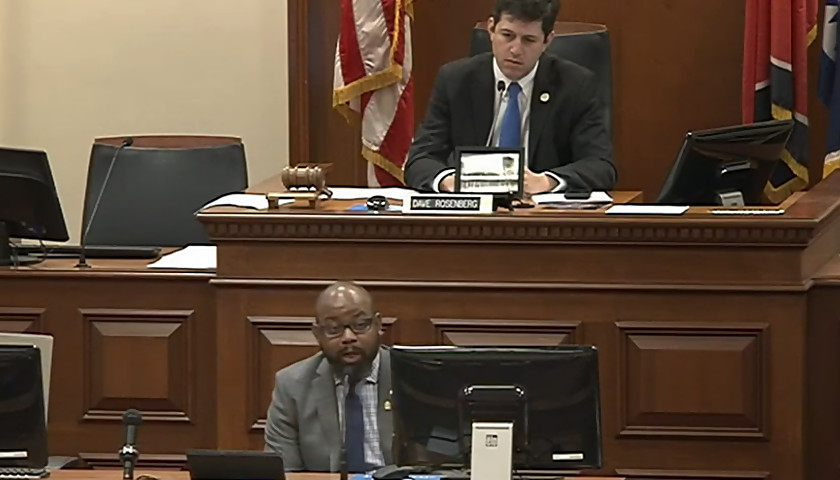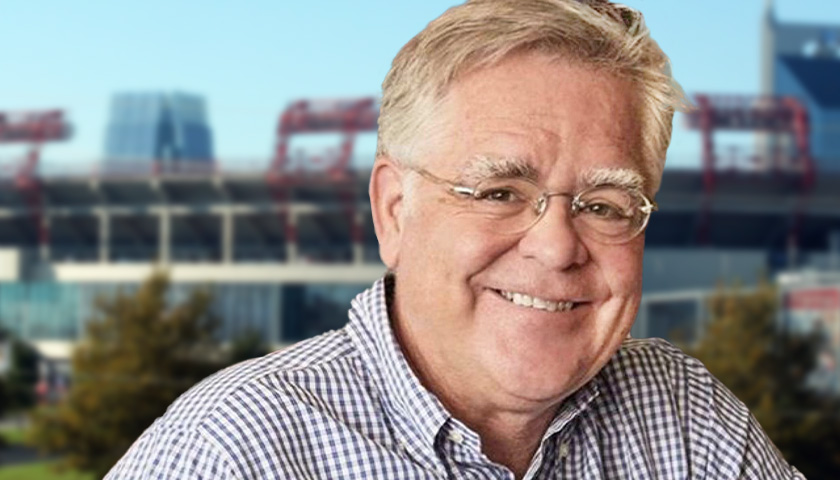Prior to his acceptance by Metro City Council members to serve on the Community Oversight Board (COB), Ovid Timothy Hughes asserted he was, in fact, a registered voter.
But records show that because he is a convicted felon, Tennessee law would have prevented Hughes from legally voting in any election without either obtaining an outright pardon from the sitting governor or successfully petitioning a court to expunge his criminal record.
As The Tennessee Star reported:
The Tennessee Secretary of State’s office confirmed with The Tennessee Star that Hughes isn’t an eligible voter. They explained that he was purged in 2008 for a felony conviction. This corroborates with details The Star reported on Friday. Hughes was arrested and charged for mail fraud, spending over $78,000 on items such as computer equipment and designer clothing using stolen credit card and private account information from a former employer.
[wonderplugin_pdf src=”https://tennesseestar.com/wp-content/uploads/2021/03/OVID-JUDGMENT.pdf” width=”650″ height=”866px” style=”border:0;”]
Hughes was sentenced to serve one year and one day.
As provided by USC 18 Section 3559, a crime for which the sentence is one year and one day is a Class E Felony.
The transcript below is from the video archive queued to Hughes’ appearance at the Metro Council Rules Confirmations & Public Elections Committee, where he affirms he is qualified to serve on the COB.
Rosenberg: Next up we have Ovid Timothy Hughes.
Mr. Hughes. (Inaudible talk) the same questions. Have you been a resident of Davidson County for at least the past year?
Hughes: I have.
Rosenberg: Are you a registered voter?
Hughes: I am.
Rosenberg: Are you a Metro employee and employment law enforcement agency elected official or spouse of any such?
Hughes: I am not.
Rosenberg: Have you demonstrated knowledge of issues pertaining to civil rights and equity and do you have experience with criminal justice and policing practices?
Hughes: I believe that I have. And I believe that I do.
Rosenberg: Great. Would you mind introducing yourself and describe your interest a bit?
Hughes: Yes. My name is Timothy Hughes. Ovid Timothy Hughes. My first name. I’m originally from Baton Rouge, Louisiana, and have been living here in Nashville, Tennessee for about 20 years. I am an organizer with a group called Black Voters Matter. I’m also a board member with the organization Gideon’s Army. And was nominated as well by the NAACP Nashville branch where I serve as the political action chair for the national branch of the NAACP.
I am looking forward to having an opportunity to serve as a mediator and a go-between between the community and the police department. My father is a retired law enforcement officer. My grandfathers were both sheriff’s deputies. I care about these issues because I understand from a perspective of an individual who has had interactions and conversations with police officers and police department officials. But also I care about the issue of public safety.
I believe that we can through transparency and equity and accountability build stronger relationships between members of the community and members of the police. In addition to the work that I do as an organizer, I also attended the police legitimacy and accountability training that was offered by the community oversight board.
I’ve attended the majority of the community oversight board meetings and have followed the development since the very beginning. I was also involved in the process of helping to collect the signatures for the petition that ultimately allows for the community oversight board to become an initiative and later be on the ballot. I care about these issues very passionately and am looking forward to having an opportunity to serve in that capacity.
Rosenberg: Thank you very much. Councilmember Sledge.
Sledge: Thank you chair. Thank you for being here Mr. Hughes. You mentioned on your application that you’re trained in adverse childhood experiences and trauma-informed care. Can you speak a little bit more about why you think that would be beneficial to the COB?
Hughes: Absolutely. And the work that we do with Gideon’s Army, in particular, we work with disproportionate minority contact. Individuals who have had interactions with police officers. In order to do that work, we’ve got to have a certain measure of training and understanding of the ways in which trauma can influence the lives of individuals from communities that have been in some instances policed aggressively.
During the research that was done regarding the creation of the community oversight board, there was a release of a report called the Driving While Black report that Gideon’s Army helped to spearhead. During that time individuals within the community were interviewed about their interaction with police officers and with the police on various occasions.
And what was learned during the gathering of information and data about that process is that there were individuals within the community who had been deeply traumatized based on the experiences that they had from police stops. As a result, there was a press conference that was held by Gideon’s Army that talked about the fact that there was a groundswell of a possibility that there might be an incident.
Shortly thereafter within months, as a matter of fact, there was both the shooting of Geoffrey Clemens who and later of Daniel Hambrick which showed in many ways that the Gideon’s Army Driving While Black was kind of the canary in the coal mine as it related to the need for greater accountability and community oversight of police officers.
But also the fact that there was an enormous gulf between what people understood to be legally permissible and what was in fact potentially dangerous in terms of the interactions between community members and police officers. So there needs to be a way to both address the harm that may have been caused in certain interactions with community members, but also to inform the public about the importance of understanding ending how the rules work, how police policies can be influenced. And I think there can be away from members of the community oversight board to service that bridge.
Rosenberg: Thank you. Any other questions for Mr. Hughes, Councilmember Styles?
Styles: Thank you chair. Mr. Hughes, given that your father and your grandfather were in law enforcement, how has that influenced your relationship with the police in your life then and now?
Hughes: Absolutely. Thank you so much for that question. I think what I’ve learned by having members of my own family be law enforcement officials and first responders is I have an appreciation and respect for what it is those police officers do. Also, the fact that there is a tremendous amount of stress that is often associated with the work of doing police community service and public service as a police officer.
It’s given me an appreciation for both the work that law enforcement officers do but also as a way of understanding just what it takes to be a member of law enforcement and how it can have a tremendous toll on the individuals who serve. And so it’s been helpful to be trauma-informed both for an understanding of how it affects community members, but also how it affects police officers.
I think also it’s given me an appreciation for and an understanding of how it is that there can often be issues where there are complexities. No one person is just one thing. And so there are officers that have a tremendous hope that they can play a role in helping to keep the community safe, but they also want to feel like they have the opportunity to go home at the end of the day. And I think there needs to be someone on the board who has an appreciation for understanding those two communities.
Styles: Thank you.
Hughes: Thank you.
Rosenberg: Thank you, council member. Any other questions for Mr. Hughes?
Styles: No.
Rosenberg: Thank you very much. Thank you very much, Mr. Hughes.
– – –
Image “Metro Nashville Council Committee Meeting” by Metro Council Rules Confirmations & Public Elections Committee.






Now that guy had some really outstanding credentials. (Sarcasm!)
He should be elected mayor of Nashville.
Great research. Love how the applicable documents/videos are embedded in the article.